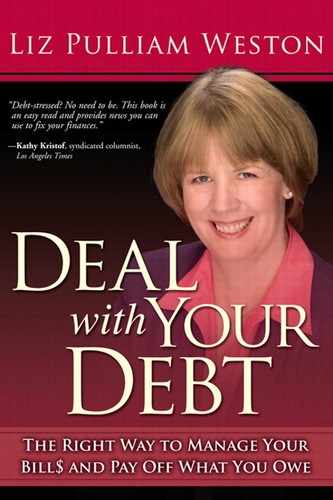Create Your Game Plan
By now you have at least a rough idea of how you want to prioritize your goals, including which debts you'll pay off first. To complete your game plan, two more steps remain: locating the cash to fund your plan and making sure you're paying the lowest rates possible so that you can get to the finish line faster.
Chapter 11 goes into more detail about the various places you can find cash. But here's a list to get you started thinking:
What could you sell? Unloading an unneeded vehicle could raise some significant cash (and lower your auto insurance premium as well). Or maybe you could auction that Hummel collection on eBay. Perhaps you could hold a yard sale to simultaneously reduce your clutter and boost your bank balance.
Where can you cut? Almost every budget has some fat. Many families spend a big chunk of their disposable income on groceries and dining out, two areas that are very easy to trim. Gym memberships are usually a big waste of cash. Or you can cut back to basic cable, or drop the service altogether. Remember, the deeper you slice, the quicker you'll be out of debt. If you need more ideas, check out one of the many frugality-oriented Web sites like The Dollar Stretcher (www.stretcher.com) or a book like Amy Dacyczyn's The Tightwad Gazette.
Can you pick up more income? Maybe you're overdue for a raise at work or can temporarily add a second job. Now is probably not the time to launch a risky, cash-eating side business, but some people can turn their hobbies into money-makers (by selling handiwork, for example) or start low-cost service businesses walking dogs, running errands, or house-sitting.
Getting your interest rates down will save you money as well. The following chapters have specific information about the best ways to reduce your rates on the major categories of debt, such as credit cards, mortgages, auto loans, and student loans.
Should You Pay Off Your Debt with More Debt?
You may be tempted to implement a more sweeping solution by using a home equity loan, a cash-out mortgage refinance, or a debt consolidator or by borrowing from a workplace retirement plan to lower your rates or your payments.
In some situations, these loans make sense. All too often, though, these solutions make matters worse.
For one thing, these loans usually turn what should be short-term debt into long-term debt. You could end up paying more in interest than if you had just paid off the cards out of your current income.
If you haven't addressed the basic problem that got you into troublesome debt, you could just be digging the hole deeper. Most people who use home equity lending to pay off credit cards, for example, run up new credit card debt within a few years. The wealth they should be building with their homes is instead being drained away forever.
Using home equity lending or a cash-out refinance has another problem. Normally, credit cards, medical bills, and personal loans can be erased in a bankruptcy filing if your financial situation really goes south. Pay them off with mortgage debt, though, and you've just secured them with a loan that can't be wiped out.
The same is true of retirement plan loans. Most 401(k)s, 403(b)s, and other workplace plans are protected from creditors' claims in bankruptcy court if you should have to file.
Withdrawing money from a 401(k) has another downside: You lose out on the tax-deferred returns that your money could earn in the plan if you left it alone. Every $10,000 you take out of a 401(k), for example, could cost you $100,000 or more in future retirement income, assuming it had been left alone to grow at an 8% average annual rate for 30 years. And if you lose your job, you typically must repay the loan within a few weeks, or you'll owe penalties and taxes on the balance.
Again, this doesn't mean you should never tap your home equity or retirement. You'll learn guidelines for when and how to do it right in upcoming chapters. Just don't turn to it as your first resort until you read up on all the potential disadvantages.
Debt “Solutions” to Avoid
One kind of loan you can probably strike off your list is an unsecured debt consolidation loan, where a company offers you a loan not secured by an asset like your house.
The fees for this kind of lending are typically outrageous, and the loans usually just stretch out your payments, ultimately costing you much more than if you'd paid off the original debt. That's if you get the loan you apply for at all; this area is rife with fraud and phony come-ons designed to part you from whatever money you have left.
You should approach debt negotiation or debt settlement with extreme caution as well. The companies offering these services typically promise to settle your debts for pennies on the dollar, but such settlements can devastate your credit score. That's if you get any service at all; sometimes fly-by-night outfits just disappear with your fee. If you really can't pay what you owe, bankruptcy is often a cleaner solution.
“Debt elimination” shouldn't even be on your list because it's an outright fraud. The criminals running this scam pretend that you can eliminate your obligation to repay your mortgage, credit cards, or other debt by using a “certificate” they provide—usually for a fee of $2,500 or more. They use all kinds of ridiculous arguments about the legitimacy of the Federal Reserve system, and sometimes they throw in a quote or two from the Constitution, but it's all bunk. What you get is a worthless piece of paper that, if you actually try to use it, will trash your credit, allow the bank to foreclose on your house, and perhaps put the FBI on your tail for trying to defraud a financial institution.
